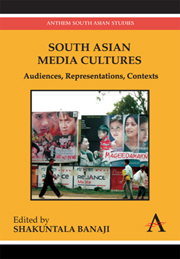Book contents
- Frontmatter
- Contents
- List of Illustrations
- 1 Introduction
- Part One Elaborating Audiences: Meaning, Use and Social Context
- Part Two Telling Texts: Media Discourse, Identity and Politics
- Part Three Alternative Producers: The Articulation of (New) Media, Politics and Civic Participation
- 11 Through the Lens of a ‘Branded Criminal’: The Politics of Marginal Cinema in India
- 12 Pakistani Students' Uses of New Media to Construct a Narrative of Dissent
- 13 Expanding the Art of the Possible: Leveraging Citizen Journalism and User Generated Content (USG) for Peace in Sri Lanka
- 14 Conclusion
- List of Contributors
11 - Through the Lens of a ‘Branded Criminal’: The Politics of Marginal Cinema in India
from Part Three - Alternative Producers: The Articulation of (New) Media, Politics and Civic Participation
Published online by Cambridge University Press: 05 March 2012
- Frontmatter
- Contents
- List of Illustrations
- 1 Introduction
- Part One Elaborating Audiences: Meaning, Use and Social Context
- Part Two Telling Texts: Media Discourse, Identity and Politics
- Part Three Alternative Producers: The Articulation of (New) Media, Politics and Civic Participation
- 11 Through the Lens of a ‘Branded Criminal’: The Politics of Marginal Cinema in India
- 12 Pakistani Students' Uses of New Media to Construct a Narrative of Dissent
- 13 Expanding the Art of the Possible: Leveraging Citizen Journalism and User Generated Content (USG) for Peace in Sri Lanka
- 14 Conclusion
- List of Contributors
Summary
What I am about to narrate is the story of the Chharas, one of the communities that constitutes the sixty million ‘denotified and nomadic peoples’ (DNTs) in India. This is not though, a ‘story of the Chharas’ in either a mythical or a historical sense, but is better described as an aerial shot of the media-channelled ripples effecting change in the lived conditions of the Chharas. It is centripetal to the extent that the loci of the narrative is grounded in the agency, cultural production and activism springing out of Chharanagar, a ‘ghetto of Chhara DNTs’ in Ahmedabad, Gujarat. One must also, it seems, locate the writing of this chapter itself in the context of these mediated socio-cultural ripples and acknowledge the crass limitations of cultural theory as a guide, even an accomplice, to social activism. As Stuart Hall said, speaking on the subject of AIDS in the 1990s, ‘against the urgency of people dying in the streets, what in God's name is the point of cultural studies?’, adding that, at the same time, ‘AIDS raises politically important cultural questions too – who gets represented and who does not – that cultural studies alone has a privileged capacity to address’ (Procter 2004, 2). From this vantage point, this chapter explores the politics of Chhara cinema, deconstructing its production process, form and audience, in seeking to locate marginal cinemas within the larger discursive context of Indian media cultures.
- Type
- Chapter
- Information
- South Asian Media CulturesAudiences, Representations, Contexts, pp. 201 - 220Publisher: Anthem PressPrint publication year: 2010



